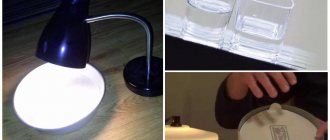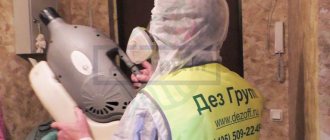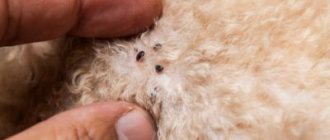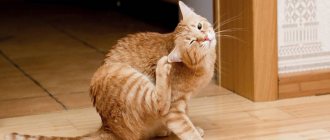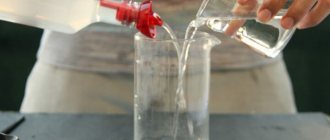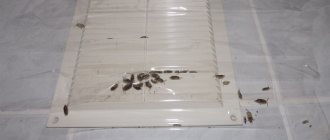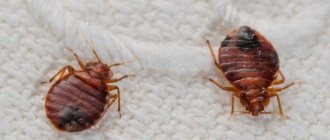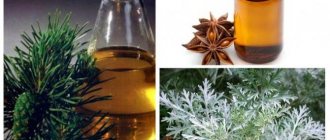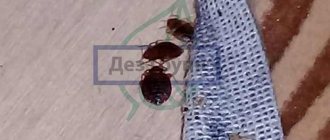Home Home and cottage Cleaning and care
Many people mistakenly believe that fleas can only attack animals and that they can only be removed by treating an infected pet. Yes, this is true, but they can easily switch to the person himself. A flea bite is very painful and can cause an allergic reaction. Often people do not see fleas as a particular threat and therefore usually do not pay attention to the fact of their presence in their home.
Fleas themselves are wingless parasitic insects, not exceeding 5 mm in size. They have a small body, flattened on the sides, with a large number of spines and bristles, thanks to which they can linger in the fur of animals, for example, between the wings of birds, in the fur of animals, on human clothing. Due to the presence of three pairs of legs, fleas are capable of jumping tens of times their normal size.
Most often, fleas are taken from the entrances of houses, neighbors' premises, as well as from pets, rodents or clothes that a person wore in the basement. Fleas carry various infections, such as tularemia, salmonellosis, hepatitis B and C, typhus and even plague. In addition, their bites can fester and swell due to harmful elements in the fleas' bodies. To get rid of fleas, it is not necessary to immediately resort to store-bought and chemical products, since this is harmful not only to animals, but also to you and your children. Therefore, it is recommended to use natural remedies that will be both healthier and cheaper.
Fleas often settle in surface cracks, carpets, various gaps, furniture, baseboard spaces and can live at a distance of half a meter from the floor. Therefore, the nature of the fight against fleas will combine chemical treatment of housing and pets with special shampoos and gels, as well as general cleaning of housing and the use of folk remedies as a fixing result.
What do fleas hate?
The main factor when dealing with fleas is knowing what they hate the most. Below is a list of things that fleas hate most.
- Cleaning. Fleas will not be able to survive with regular and thorough cleaning of your home, especially with the use of special products. It is also important to vacuum and dust furniture, as flea larvae may be stored there.
- Aerosols. When fighting fleas, aerosols will play an important role. One cylinder is enough for ten squares of area, so you can calculate the required volume of aerosol yourself. After applying the aerosol on the surfaces, it is not recommended to wash them for several days, otherwise everything will go down the drain and the parasites will appear again.
- Wash. The main place where fleas accumulate is usually things and therefore they should be thoroughly disinfected. To do this, wash the items at a high temperature and then iron them with a hot iron. Also treat blankets and pillows in a similar way, because they can harbor not only fleas, but also house bugs.
- Herbal infusions. Herbal infusions, which have a sharp and specific odor that can repel fleas, will be a good natural enemy of fleas. To do this, mix part eucalyptus, part wormwood and tansy. Pour boiling water, strain and spray the room with a spray bottle of this decoction.
- Cold. Fleas do not tolerate cold, so it makes sense to regularly ventilate your home and dry things in the open air, this will also help in the fight against fleas. In addition, the bright rays of the sun will also not be to the taste of pests, so take this advice to heart.
A good folk remedy for fleas is a mixture of salt and soda. To do this, take equal parts of salt and baking soda, mix with water and spray over the floor throughout the house.
Which disinfectant to choose
How to remove fleas with an antiparasitic agent, which drug should be preferred? Previously, housewives used exclusively “Dichlorvos”, but it is almost impossible to find it in the original version. The active component dimethyldichlorovinylphosphate has long been replaced by more effective and, importantly, safe substances - pyrethroids.
The latest generation of preparations contain synthetic and natural insecticides and do not have a specific odor.
Carefully study the composition, it should contain the following elements (ideally there should be several insecticides, since fleas may develop resistance to a certain component):
- Pyrethrin (pyrethrum) is a component of Dalmatian chamomile.
- Tetramethrin, talstar, cypermethrin, deltamethrin are synthetic analogues of pyrethrin.
- Fipronil - most often used to remove parasites from cats and dogs.
- Benzyl benzoate is also used to remove lice.
- Piperonyl butoxide is often present in combination with permethrin.
Preparations such as Dichlorvos and Karbofos, although relatively inexpensive, are today used only for treating non-residential or industrial premises.
Disinfection preparations are available in various forms:
- concentrates that need to be diluted in water;
- aerosols and sprays in cylinders;
- pencils, dusts, insecticidal powders.
INTERESTING TO KNOW: How to wash cat urine from clothes
Household chemicals experts say that concentrates are the most effective in fighting fleas, and they have another advantage - an affordable price. Using just 1 bottle of concentrate, you can treat a large area. Disadvantages include toxicity and unpleasant odor. The most popular concentrates are Cucaracha, Executioner, Agran, Tetrix, Tsifoks.
But concentrated microcapsule insecticides, produced in the form of suspensions, are practically odorless (Get, Zone).
Before use, the concentrates are diluted in water according to the instructions, after which the solution is poured into a regular spray bottle and sprayed throughout the apartment. The principle of operation is the same as that of the spray.
Ready-made aerosols are more convenient to use, flavored, practically safe to use and give good results. The disadvantage is the high price. Combat, Raptor, and Raid are considered the most effective.
Pencils and insecticidal dusts do not give as good a result as concentrates and aerosols, moreover, they are toxic and are more aimed at destroying larvae than adults, which feed on nothing but blood. It is rational to use dusts in non-residential premises - attics, verandas, cellars. Phenaxin and Clean House have proven themselves to be excellent. The advantage of such drugs is their reasonable cost.
Under no circumstances should you treat your cat with a product that is used to clean an apartment, otherwise the animal will suffer severe toxic poisoning and serious side effects.
The room can be re-treated after two weeks, since after one use of the antiparasitic agent, all fleas will not die.
If we talk about self-treatment of premises against fleas, then even if there is a very large premises, the financial issue is resolved within 1,500 rubles. But the disadvantage of such an event is the labor intensity and the possibility of oversights, thanks to which some individuals can safely avoid the effects of the antiparasitic drug.
A much more reliable way is to call a team of exterminators to your home, who not only know how to treat the apartment professionally, but will also give a guarantee for several months.
How to get rid of fleas using folk remedies
The appearance of fleas in an apartment brings discomfort to all residents of the room, both people and animals. Since this problem is quite relevant even now, there are a variety of different chemical agents for killing parasites. However, they are either too harmful to use, or ineffective, or too expensive. Therefore, folk remedies and advice that have been used for decades are often used. Here are the most effective methods for fighting fleas.
The main ingredients against fleas are:
- herbal infusions
- garlic
- sawdust
- salt
- Brewer's yeast
- baking soda
- pine shavings
Herbal infusions are most often used as a folk remedy for parasites, because their specific aroma repels insects. Wormwood, eucalyptus, mint, and tansy cope best with this. These herbs have a rather pungent odor and medicinal properties, so a solution with their composition will be useful both against parasites and simply as medicinal inhalations. To prepare the solution, you need to take equal parts of wormwood, mint and eucalyptus, pour boiling water and leave. After this, rinse all the cracks and nooks and crannies with this solution, and wipe all the furniture. This method will help protect you from fleas and other pests.
Pine sawdust is a good natural remedy for fighting parasites. They can be used in places where your pet likes to be most. For example, you can fill his litter with sawdust or grind it into powder and pour it into the cat's litter box. This measure will help prevent fleas in your home.
Another well-known remedy against fleas is Persian chamomile, the stems and leaves of which contain pyrethrins - substances that fleas cannot tolerate. To use this plant, take the leaves and stems of chamomile and place them around your home. But the effectiveness of Persian chamomile lies only in its fresh form, so you need to change the leaves every few weeks.
A very effective method is to use table salt and baking soda. To do this, the ingredients are taken in equal parts and the resulting powder is sprinkled on all carpet surfaces, and the powder is also rubbed into soft toys and any other fleecy surfaces. Next, the powder is kept on the surfaces for 12 hours from the moment of its application and after that it is necessary to thoroughly vacuum the treated floors and products several times. It is recommended to regularly carry out procedures that will rid you of fleas and other parasites.
A combination of garlic and brewer's yeast is used well against fleas. These ingredients are harmless to people and pets and are therefore completely safe for widespread use. All carpets, rugs and other surfaces are treated with this mixture. After application, the mixture should remain for at least 10 hours, after which it must be thoroughly vacuumed. The effect of this product is the pungent smell of garlic and yeast.
Peppermint will also save you from fleas; thanks to its pungent aroma, it is a reliable enemy of parasites. Fresh mint leaves are sprinkled throughout the home, especially in nooks and crannies. In addition to its antiparasitic effect, mint has a pleasant aroma that has beneficial properties.
Don't forget about citrus fruits, especially oranges, lemons and grapefruits. The peels of these fruits are laid out throughout the room, especially in gaps, hoods, corners and other hard-to-reach places. This method also works well against moths.
You can also use pine shavings and wormwood, which are poured in front of the entrance to the home. This will also help repel unwanted insects and pests.
Causes of fleas in the house
Insects are often brought indoors from the street by a pet dog or cat, or by people on shoes, clothes, or in a bag of groceries.
Other common factors for fleas in the home include:
- movement of parasites through the ventilation system or cracks;
- entry from public corridors and entrances;
- from rodents;
- lack of hygiene, unsanitary conditions;
- dust that appears after major repairs.
The spread of fleas is often facilitated by dampness that occurs in apartment bathrooms and basements. Insects can move from attics and basements, especially if rodents have been poisoned there using chemicals. Therefore, parasites often attack apartments on the top or first floor.
Basic recipes against fleas
- DIY shampoo. This shampoo is quite safe and natural, which you can prepare yourself without unnecessary effort. To do this, you need a quarter of baby soap, which is filled with warm water and put on fire. The mixture is cooked over medium heat until it becomes jelly-like. After removing from heat, add grated onion to the mixture. This mass is applied to the pet’s fur and then wrapped in film for 20 minutes.
For greater effect, you can add a herbal decoction or egg yolk to the mixture, so the shampoo will become even more useful.
- "Salty" bathing of the pet. To do this, you need to dilute the salt in warm water in the proportion of one bucket to a pack of salt. The animal is placed in the solution up to neck level and kept for no more than five minutes. At this time, you need to constantly rinse the wool and then rinse thoroughly with running water. Instead of salt, you can also use a decoction of wormwood or eucalyptus. You can also buy tar soap and use it as a flea repellent. This soap has a healing and healing effect, so it is well used against fleas.
- Regularly place bunches of wormwood, mint, and tansy around the living space. Also lavender or linden bouquets, which will repel insects with their smell.
Treating residential premises against fleas
To successfully get rid of fleas in living rooms, it is necessary to carry out general cleaning there. You need to wash not only the floors, but especially the corners of rooms, gaps, cracks and floor coverings, as well as under carpets and furniture.
The most important step in pest control will be the treatment of domestic animals, because they are the main carriers of fleas. A collar soaked in fipronil works well for removing fleas. However, do not forget that it is absorbed into the dermis and accumulates, where it then enters the pet’s blood, causing irritation. And so it turns out that there are no fleas, but the animal is still itching. It will be important to use various gels, shampoos, drops. You can first buy shampoo and wash your pet, and then put flea drops on the withers.
Remember to treat all surfaces in your home, including carpets, furniture and walls. It will be most convenient to use various aerosols, which you just need to spray and wait. But before spraying, it is necessary to take people and pets to a separate room and only then disinfect the room. You can purchase ampoules and dilute them in warm water, and then pour the solution into a spray bottle and treat all surfaces. One ampoule of the product is needed for one bucket of water.
Tar soap for fleas
The composition of tar soap includes sodium salts, citric acid, table salt, thickeners and the main component - birch tar.
Tar is a thick black liquid with a pungent odor and bactericidal, anti-inflammatory and insecticidal effects. Tar soap relieves itching and irritation. This is a natural folk remedy and it is inexpensive.
Tar is available in the form of solid and liquid soap, as well as shampoo. It is more convenient to treat pets with liquid products. But if you use hard soap, then first soak the bar of soap in water until foam forms. Tar soap is also used for washing floors, treating walls and washing pet accessories against fleas.
However, the use of tar soap requires moderation. According to a study by the New Zealand Skin Diseases Association, there was an increased risk of skin cancer associated with the use of tar soap in animals, but there was no effect on humans.
Video “Bathing a cat with tar soap”
Treatment of non-residential premises
This applies to basements, garages and other non-residential places. Fleas also appear here, which most likely come from rodents. So spray poison that will kill rats and mice.
Fleas that live in basements are called earth fleas. They live in rooms with high humidity and settle 1.5 m above the floor. They enter residential premises through ventilation or hoods. Basements or garages are easier to treat than residential ones and therefore the treatment will not last long. Dried bouquets of wormwood and tansy should be placed in the corners; their pungent smell will repel fleas. Wild animals usually lie down in the bushes of these plants and the fleas jump off on their own.
You can also treat the surfaces with a solution of kerosene or turpentine. To do this, mix them with water and detergent, and then treat the entire surface of the room: walls, floors, shelves, etc. But this is only suitable for non-residential premises, since the unpleasant odor remains for a long time.
Folk remedies
When you first detect signs of the presence of fleas, it is advisable to try to eliminate the problem using traditional methods. But before you start processing the home, you need to cure the animal.
Among the many time-tested methods, the most effective are:
Infusion of wormwood and tansy
In a small container, steam the dry ingredients with boiling water (250 ml):
- wormwood – 2 tbsp. l.;
- tansy - 1 tbsp. l.;
- eucalyptus leaves - 1 tbsp. l.
The herbs are infused under the lid for 10-12 hours. Afterwards, the liquid is filtered and the spray bottle is filled with it. This product should be used to treat the entire home (especially furniture upholstery, carpets, baseboards).
Freezing
It is unlikely that it will be possible to completely cool the entire apartment, but it is quite possible to supplement this method with another type of treatment. To do this, in severe frost (below -15°), you need to take carpets, bedspreads, and blankets outside. Leave them to freeze for 2-3 hours. At this time, the apartment is treated with a disinfectant.
Baking soda
You can make your own disinfectant powder by mixing baking soda and table salt in equal proportions. The product is used to treat carpets and other floor coverings. After a 2-4 hour procedure, the surfaces need to be vacuumed.
Pine needle shavings with wormwood
Chop fresh wormwood a little and mix with coniferous wood shavings. The mixture is laid out in all corners of the apartment, under furniture and near cabinets. You need to change the bookmarks as the aroma wears off (about once every 7-10 days).
Treatment of summer cottages against fleas
An area that has become susceptible to attacks by flea colonies must also be rid of these parasites. Carefully treat your pet's place: a house or booth, bedding, or just a favorite place. Remember that fleas love places with high humidity and especially where there are organic food debris. They also like to settle in grass where animals are.
Always dispose of natural debris such as fallen leaves, grass clippings or straw. It is better to bury such garbage under trees, fertilizing and insulating their roots before the cold weather. Since fleas love to breed there, you will leave them without a place to live.
The summer cottage can be covered with pine sawdust with wormwood or mint leaves, this will perfectly protect against fleas and other parasites. In addition, it will serve as an excellent humus for plants.
What to do if there are children at home?
Children can often pick up fleas from pets. It is wonderful when a child comes into contact with animals, because he learns kindness and attention to others. However, such communication can be fraught with the presence of parasites in pets, which can cause great harm to the child. And we are not just talking about bites - the main danger is a possible infection that must be avoided.
- Nematodes. So, if you have animals in your home that have fleas, we recommend purchasing nematodes. These little worms feed on flea larvae and will help you fight fleas.
- Medicinal shampoo. A special shampoo consisting of herbs: eucalyptus, pine, lavender will also help against fleas. After purchasing the product, rinse your pet’s fur thoroughly, not forgetting the neck and chin area. Bathe your pets regularly to prevent the threat of fleas.
- Repellents. It will also be an important decision to buy this product of natural origin, especially if you have a child. But you need to buy only those repellents that contain wormwood, mint and pine nut oil, because they are the most powerful natural opponents of fleas.
- Lemon infusion. If you don't want to buy shampoo or repellents, then a folk remedy will help. To do this, take one lemon and boil it in 500 g of water. After this, leave it for 7 hours and after this time, thoroughly rub the pet’s fur with the decoction. Lemon is also an excellent opponent of parasites, including fleas.
- Spring-cleaning. In addition to pets, your home also poses a threat, which is also unsafe due to the presence of fleas. For them to disappear, you need to thoroughly clean each room, ventilate and wash every corner. It will also be important to dry and iron items as they are also a common breeding ground for fleas.
- Exterminator. If these methods do not help in the fight against parasites, the only correct solution would be to hire an insect exterminator who will clean your home of fleas, but you will have to live in another place for a week, but we hope that the comfort of you and your children is most important to you.
Prevention
No matter what measures you take, it is impossible to completely get rid of fleas using folk remedies. For a serious effect, chemical treatment is needed, which will give a guaranteed result, but will be harmful and expensive. Traditional methods, in turn, are preventive in nature and are suitable as a strengthening result. The first step is to use a strong chemical treatment, for example dichlorvos. A rough plan on how to protect yourself from fleas is as follows:
- Before starting the manipulations, it is necessary to disinfect existing pets with special flea products, since if you skip this stage, further actions will be useless.
- Next, you need to carry out a global general cleaning of the entire home, taking into account any hard-to-reach places. Dichlorvos will help here, spray it in all corners, cracks, floors and walls to a distance of at least a meter.
- After this, it is necessary to seal all window and door openings and leave the housing for 6-7 hours.
- When entering a room, open all openings and ventilate the room. After time, thoroughly wash all surfaces with a solution of choir, vinegar, bleach or turpentine.
- Don’t forget about pet bedding and belongings, because they are the main source of flea breeding. They should be treated with an insecticide and vacuumed.
There is no prevention against fleas as such, because it is not known how you or your pet can catch them. But the main thing in the fight against parasites is compliance with hygiene rules and regular cleaning of the premises. It is necessary to frequently ventilate the room, since cold is fatal to fleas. It is also important to keep all pillows, blankets, mattresses and clothing exposed to sunlight. Don’t forget about washing soft toys and cleaning furniture. Thanks to wet cleaning and a vacuum cleaner, you can protect yourself from fleas and other pests for a long time.
Features of wrestling
What measures need to be taken to get rid of fleas in your own home? First you need to remove them from pets. Modern manufacturers now offer a variety of products for these purposes. These can be special shampoos, sprays, drops, collars and much more.
However, fleas can appear even in a house where there are no pets. A person himself can bring parasites into his home after staying in an infected room or simply by petting a sick dog on the street.
Before you start fighting insects with chemicals, you will need:
- Ensure that people and animals leave the room for at least 4-5 hours. Hide the dishes and all food. Wash the floor thoroughly with vinegar solution. If there is a basement, treat it with dichlorvos or another flea repellent. Check the tightness of window and door openings.
It is necessary to treat the room using protective equipment. At the end of the work, everything must be thoroughly washed and the room ventilated. If you cannot get rid of parasites on your own, you will have to contact a special service that will quickly and efficiently treat the infested home.
Traditional methods
Since the appearance of fleas in the house is not a new problem, there are many quite effective folk remedies to combat them. Some people prefer them because they typically use natural substances that contain virtually no toxins.
Certain odors repel and irritate fleas. For example, the smell of peppermint, wormwood, and strong tobacco causes discomfort in insects. Also included here are anise, pine and lavender oils.
Fleas do not tolerate the smells of tar and lavender soap, so cleaning your apartment using a soap solution is a good way to repel them.
A good preventive method against fleas is to fumigate the room with Indian sandalwood sticks or incense. This procedure will also repel other insects.
A solution of ammonia has a good effect. A solution prepared in a ratio of 20-25 drops of the substance per 5 liters of water requires wiping furniture and window sills, as well as thoroughly washing the floor.
A simple and effective remedy is a mixture of soda and salt scattered on the floor (1:1 ratio). The greatest attention needs to be paid to baseboards and all kinds of cracks. It is best to leave the house for a couple of days after this. Upon return, the mixture should be swept out and the room vacuumed. After this, adding pine or lavender oil to the water, perform wet cleaning.
Use of essential oils
Essential oils for fleas have proven themselves very well. They are used individually or by mixing several types. Most often, lavender, cedar, eucalyptus and other oils are used for this purpose. Just a few drops of the product added to the shampoo when bathing your pet will help repel insects.
If you dissolve 3-5 drops of lavender or eucalyptus oil in a glass of water, place this liquid in a spray bottle and spray your dog with it periodically, you can protect your pet from fleas. You can also tie a scarf around your dog’s neck after dropping a few drops of essential oil on it. Such a collar will be effective for several days, after which the scarf must be removed and washed thoroughly.
Action of wormwood
A very common remedy is wormwood for fleas. Insects are very afraid of its smell. One of the popular methods of combating the use of this herb is a decoction. To prepare it, wormwood leaves (20 g dry or 40 g fresh) need to be boiled in 0.5 liters of water. After the broth has cooled, they need to treat the animal’s fur.
It is worth noting that while treating a pet, insects will jump off it, so it is better to perform the procedure outside. Wormwood is absolutely harmless for small kittens and an adult cat - their mother, who can lick her babies. It is important to remember that the smell of wormwood should be strong and persistent - then the animal will be less at risk of becoming infected with fleas.
Using tar soap
Tar soap against fleas is also considered a good remedy. Its cost is low, and the effect is quite good. However, you need to know how to use it correctly:
The animal must be thoroughly wetted with water and soaped well. It is especially necessary to treat with soap those areas where insects breed - the stomach, withers, folds near the paws; the soap should be washed off after 5 minutes; after rinsing with a comb, you need to comb out the insects; re-treatment should be done no later than 10 days.
It is also worth noting that tar soap has a beneficial effect on the healing of wounds formed when pets scratch insect bites.
Thus, in order to get good and quick results in the fight against fleas, it is a good idea to combine traditional methods with industrial insecticides. This combination will lead to victory over parasites much faster. Pets will be healthy and calm, and the house will be clean and cozy.
